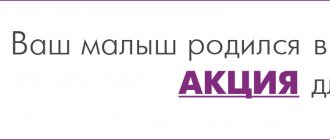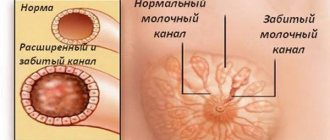Urgent weaning. Good experience
The topic of weaning has been somewhat scary to me for a long time. It seemed to me that the close thread connecting me with my child would break. On the one hand, endless nights with frequent waking up, the need to stick to a diet are tiring, but on the other hand, realizing that you are giving your child the best, and seeing how much my baby needs me, you feel like a truly full-fledged mother.
At first I had the intention of feeding at least until a year, and then, when the age passed this mark, to feed until we both felt that we had to finish. And everything would be fine if it weren’t for the verdict of my attending physician: “Urgently wean the baby off your breast!” To all my bickering and arguments in favor of breastfeeding, the doctor had counterarguments, and it was useless to argue with them. When asked how best to do this, she recommended that I leave the child for four days, express my breasts and bandage them.
I just tried to imagine how my baby’s nights would go without her mother, and I shuddered. And where will I go? No, this option is not for us. Should I first try going to another room for the night and leaving them alone with my husband? Listen to your daughter's tantrums from the next room? I could have been inactive for fifteen minutes, or half an hour, but then I couldn’t stand it and went to help my husband out and calm my daughter down. And my husband has to work in the morning and won’t get enough sleep. I began to study thematic literature, and mostly came across advice that you need to feed for a long time until the child himself is ready to give up breastfeeding.
Fortunately, we were already one year and five months old, and we fed mostly in the evening before bed and several times at night. During the day we no longer fed. I decided to wean not abruptly, but gradually. At night, when she woke up and demanded breasts, I told her: “Boobs.” My daughter already knew what “bo-bo” was, and despite the fact that she really wanted to suck, she cried a little and calmed down. But she could not fall asleep without a breast, and had to rock her in her arms. For a couple of nights we practiced skipping feedings, but it did not bring any satisfaction, since no progress was visible.
I was advised to put mustard on my chest. I read somewhere that this is not a very good way, but I still decided to try it. At home there was only French mustard, with the addition of all sorts of impurities, flavorings, acids, etc. and smelling of sour vinegar. Feeding a child such a product would be dangerous. But I came up with a plan. During the day, I started pointing to my daughter at my chest, without undressing, and saying: “Tits bo-bo.” The child even began to feel sorry for me and sympathetically stroke my chest with his hand. And in the evening before bed, when it was time to feed, I smeared mustard on my breasts, went up to my daughter and again said the familiar phrase and added: “Smell it!” Knowing my daughter’s fastidious and clean nature, I hoped that it wouldn’t come down to a taste test. And so it happened. The daughter sniffed and grimaced. Then, after thinking, I sniffed it again - and the same result.
At night everything happened again. Of course, there was some crying from my daughter from resentment, but it was short-lived. During the day, it became clear that my breasts were very full from the unusual lack of emptying, and, remembering the advice, I diligently expressed by hand and tightened the scarf tightly, tightening my breasts. Probably, I went too far with this, or, expressing out of habit, I greatly “crushed” my breasts, which is why after a few hours of tightening my breasts became unpleasantly sore. After taking off the scarf, after a couple of hours, my breasts again became “stony”, and I realized that I needed to express myself, but this would not lead to anything good: tomorrow everything would be the same as in a vicious circle again. Moreover, frightened by stories about mastitis and lactostasis, I felt completely unwell.
I even regretted that I began weaning so abruptly, thinking only about the well-being of the child and giving up on myself, and was ready to breastfeed my child as a savior. But my husband came to my rescue. Surprised that it was so easy to outwit my daughter, he, like me, did not want the first positive result to go down the drain, and he himself offered to suck the milk from my breast. What a relief it was! I no longer began to pull and express milk, and the next day there was no longer a strong hot flush, although my husband’s help was needed again. And again, before going to bed, I smeared myself with mustard and prepared to apply more when I woke up at night. But it turned out that this was unnecessary.
My daughter no longer began to smell her breasts at night, although she woke up. The transition period continued for a couple more days, and then, finally, we got the result of our efforts: my milk stopped flowing, the baby began to sleep all night without waking up. For us, this was simply fantastic, since from birth we had a big problem with night sleep; there probably wasn’t a single night when we slept “through and through.” In general, the weaning was very soft and painless, I didn’t expect it myself!
Weaning Tips
The process of weaning is an important stage in the relationship between mother and child. In some cases it happens smoothly and gently, in others it happens urgently and quickly. But in any situation, a mother who is about to wean her child from the breast begins to look for information on how best to do this. After all, there is room for concern about the health of the child, and about the condition of the mother’s breast, and about the psychological comfort of all participants in the process. While in this search, a woman comes across stories about how, for example, she can put something on her breasts so that the child will refuse it. In this article we would like to analyze the main “harmful” tips for weaning.
As mentioned above, one of the most popular is the recommendation to lubricate the nipples with something bitter - mustard, hot pepper, garlic or aloe juice. This is explained by the fact that the baby will not like the taste of the breast, so he will no longer want to suck on it. Indeed, a changed taste will most likely cause negative emotions in the baby, but this is not just a matter of taste. From birth, the child is accustomed to satisfying his needs by sucking on his mother’s breast. This helped him quench his hunger and thirst, calm down, and fall asleep. If a child does not know how to do at least some of the above otherwise, then such weaning will be a great stress for him. Also, such a sudden weaning carries with it a high risk of developing lactostasis in the mother. In addition, both mother and baby may have an allergic reaction to all these substances.
The next most popular advice is to scare the child with the appearance of the breast by painting it over with a felt-tip pen or brilliant green paint, covering the nipple with an adhesive plaster, or placing a fur mitten in the bra so that the baby, when he sees it, gets scared and does not want to breastfeed anymore. You shouldn’t do this for the same reason that you shouldn’t put anything on your chest.
The next common advice is to leave the baby for a few days or ask relatives to take him with them. The fact is that the completion of breastfeeding (if it is not initiated by the child himself) is in itself a stressful situation for a little person. It turns out that the child is deprived not only of his breast, but also of the support in the person of his mother, which he so needs during this period. He is forced to deal with this himself. For many children, such abrupt weaning does not pass without a trace. As a result of such actions, the baby may begin to cry a lot at night, sometimes nervous tics appear, various manifestations of anxiety, as well as even greater hang-ups on the mother.
The next “harmful” advice is the recommendation to tighten the breasts tightly to reduce blood circulation in the mammary gland. Until recently, this was a fairly popular method of stopping lactation, but now this recommendation can be found less and less, since there is an understanding that tugging further increases the risk of developing lactostasis and mastitis. It is important that during the weaning process, the woman’s body gradually switches to producing less milk.
Well, the last, but most “fashionable” advice, which can often be found both on the Internet and heard from friends, is to suppress lactation with the help of a “magic” pill. Interrupting breastfeeding with medication is the most extreme option when an emergency cessation of milk production is necessary according to indications. And then, depending on the duration of lactation and the characteristics of the body of a particular woman, the drugs may not give the desired result. Only a doctor prescribes medications and their dosage, because they have serious side effects and the doctor must weigh the risks and benefits of their use.
In the modern arsenal of breastfeeding consultants there are other methods of weaning that do not harm the health of mother and baby. The best option is a gradual, painless end of feeding, but if the situation is such that you need to stop breastfeeding urgently, then before taking any emergency action, consult with specialists - a doctor and a lactation consultant.
Irina Chemodanova, breastfeeding consultant.
Mustard and brilliant green as a weaning method
Question: My daughter is almost 2 years old, and we are all sucking boobs. I can’t even imagine how difficult it will be for me and her to part with this. It's difficult, but it's necessary. Therefore, I wanted to clarify, has anyone tried to smear mustard or brilliant green on their breasts? How effective is it? I want to wean him immediately, and not gradually, because I don’t have enough willpower. Valusik Answer: I want to formulate the attitude of breastfeeding consultants to such weaning methods as “ smearing the breast with something ugly and tasteless so that the child stops taking it. ” We do not recommend this method of weaning. Most breastfeeding moms will agree that the best weaning is to gradually, gently reduce feedings (see Ending Breastfeeding Without Stress). Then, by the time breastfeeding is completed, both the mother, the child, and the mother’s breast are ready for it, in this case everything goes easily and painlessly. With this approach, the child’s stress level is minimal, which means that the risk of a negative impact on the child’s health and psyche is minimized. What are the possible consequences? The need, which was strong in the child, suddenly suddenly ceased to be satisfied in the same way as it was satisfied before. Maybe the child was actually ready for weaning and there would be no consequences. Or maybe the consequence of this will be stress, illness of the child (this is a common form of stress), negative memories in the future, some negative psychological consequences (someone may perceive a sudden sharp change in the taste of milk as a form of betrayal). The child - if the need remains - will try to satisfy it in a different way, suck on some objects, get sick, make trouble, withdraw into himself, and so on. Perhaps in the future he will remember that the object most dear to him suddenly changed its taste for an unknown reason (why? Maybe it’s my fault that the breasts stopped producing tasty milk? - some children tend to blame themselves for many external adversities). Finally, we must not forget about the purely medical consequences . Even a minimal substance that gets on the oral mucosa can cause an allergic reaction, including anaphylactic shock in a predisposed child (this especially applies to medications, as well as herbs - aloe, wormwood, etc.). In addition, substances such as mustard, mayonnaise and other foods or medicines smeared on the chest can cause stomach problems, especially serious in children under one year old. The fact is that many children simply unexpectedly eat the amount of “tasteless substance” that their mother spread, so be prepared for this. And bitter substances are bitter because they are harmful, undesirable for humans - that’s how nature designed them. Therefore, for children under one year old, this method is especially dangerous. Limiting feedings is an educational moment , it is the ability to come to an agreement with the child, understand his needs, and at the same time insist on your own as much as is necessary for you and at the same time non-traumatic for the child. By gradually setting boundaries and facilitating the disappearance of feedings, you gain the necessary experience and the ability to limit the child, negotiate with him, and be a leader in the mother-child pair. Without this skill, raising a child is a difficult and dangerous process. The child, in turn, learns to gradually detach from his mother and satisfy his needs in a different way - eat and drink when hungry, hug his mother when scared and sad, play when bored, and so on. Smearing your chest with brilliant green or hilak forte is not a solution to an educational problem, but an avoidance of it, and in this case, this problem will sooner or later arise again , in a different form. If there is some problem due to which you cannot reduce feedings - you cannot agree with the child, you cannot clearly refuse him, you cannot understand the child what he needs and give it to him in another way, in general, the mother-child couple is not ready for weaning - and you lubricate your breasts, you get risks (risk of lactostasis and mastitis, risk of stress in the child) and do not gain a solution to the problem of communication with the child. You will have to solve it anyway, later ... At another time and in another place. Occasionally, this measure, in my opinion, in a stressful case is the lesser of the evils - for example, in case of a sudden illness of the mother, or in case of a new pregnancy and a threat - when she does not have the time and energy for a smooth weaning. However, such situations are very rare. If the child is very small and has a need to suck, it is, of course, advisable to introduce a pacifier, a bottle, a soft toy, or something that will replace the child’s missing breast. Maximize skin-to-skin contact with your child. But if you have time to spare, it is ALWAYS better to solve the weaning problem differently. Both other mothers and consultants will always help you with this. Read the topics, try, one step forward, two steps back, and you will succeed. For a small child, mother and mother’s breasts are a source of kindness, tenderness and tranquility. For many children, especially under 2 years old, the breast is confidence in the stability and reliability of this world , and if at one fine (terrible) moment this all collapses and instead of a warm, familiar and reliable breast the child receives something bitter and hostile, he feels deceived (and sometimes guilty), the support disappears from under the feet (if the child was not at all ready for weaning). Put yourself for a moment in the place of a baby who runs to his beloved mother/breast for comfort, and there is mustard…..Can any of us imagine the power of resentment and disappointment of a small child? So let's try to deprive him of the opportunity to experience such disappointment. Thanks to bistrinka, Ptashka, Kozyavka’s mother, Dinka says goodbye to childhood, Tanda for help in working on this text. More details about the medical consequences from an anesthesiologist here. How to excommunicate in all other ways? Here is an educational program on excommunication.










